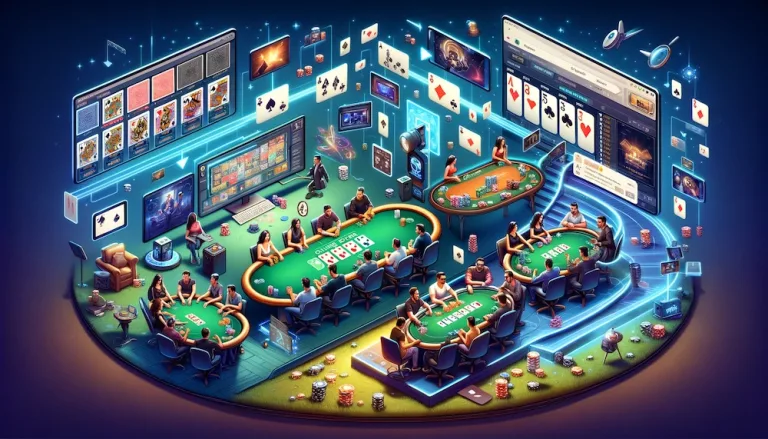Online poker has come a long way since its inception, evolving from simple virtual tables to sophisticated live dealer experiences that mimic the thrill of playing in a real casino. This transformation has been driven by advancements in technology, changing player preferences, and the continuous pursuit of innovation within the online gambling industry. In this article, we explore the history, current trends, and future prospects of online poker, highlighting how the game has adapted to meet the needs of modern players.
The Early Days of Online Poker
The Birth of Virtual Poker Rooms
The history of online poker dates back to the late 1990s, with the launch of the first virtual poker rooms. These platforms allowed players to compete against each other over the internet, bringing the excitement of poker to a global audience. Early pioneers like Planet Poker and PartyPoker set the stage for what would become a booming industry.
The Poker Boom
The early 2000s saw a massive surge in the popularity of online poker, fueled by the “poker boom.” This period was marked by the rise of televised poker tournaments and the meteoric success of players like Chris Moneymaker, whose victory in the 2003 World Series of Poker Main Event highlighted the potential for amateur players to achieve professional success. This boom led to an influx of new players and the rapid growth of online poker platforms.
The Rise of Live Dealer Poker
Bridging the Gap Between Online and Live Play
While virtual poker rooms offered convenience and accessibility, they lacked the social interaction and atmosphere of playing in a live casino. To bridge this gap, online casinos began introducing live dealer poker games. These games use real dealers, physical cards, and live streaming technology to create an authentic poker experience that players can enjoy from their homes.
How Live Dealer Poker Works
In live dealer poker, players join a virtual table and interact with a real dealer via live video feed. The dealer manages the game, deals the cards, and oversees the action, just as they would in a brick-and-mortar casino. Players can communicate with the dealer and other players through chat functions, adding a social element to the game. This format combines the best of both worlds, offering the convenience of online play with the realism of live poker.
Technological Advancements Driving Evolution
High-Definition Streaming
The quality of live dealer poker games has been significantly enhanced by high-definition streaming technology. Crisp visuals, clear audio, and multiple camera angles create an immersive experience that closely resembles being at a real poker table. This technology ensures that players do not miss any action and feel fully engaged in the game.
Mobile Compatibility
As mobile gaming continues to grow, online poker platforms have adapted to ensure their games are compatible with smartphones and tablets. Mobile-friendly interfaces and responsive designs allow players to enjoy live dealer poker on the go, making the game more accessible than ever.
Artificial Intelligence and Machine Learning
Artificial intelligence (AI) and machine learning are playing an increasingly important role in online poker. AI can be used to develop advanced algorithms for game fairness and security, while machine learning helps platforms understand player behavior and preferences. These technologies enhance the overall player experience and ensure a safe and fair gaming environment.
The Benefits of Live Dealer Poker
Enhanced Social Interaction
Live dealer poker adds a social dimension to online gaming, allowing players to interact with dealers and fellow players. This interaction creates a sense of community and camaraderie, making the game more enjoyable and engaging.
Trust and Transparency
Using real dealers and physical cards in live poker games adds a level of trust and transparency that virtual games sometimes lack. Players can see the cards being dealt in real-time, ensuring that the game is fair and free from manipulation.
Realistic Gaming Experience
Live dealer poker offers a more realistic gaming experience, replicating the sights and sounds of a live casino. This immersion enhances the excitement of the game and appeals to players who crave the authenticity of live play.
The Future of Online Poker
Virtual Reality Poker
The future of online poker may include virtual reality (VR) technology, which has the potential to create fully immersive poker environments. VR poker would allow players to sit at virtual tables, interact with realistic avatars, and experience the game in a 360-degree setting. This innovation could revolutionize the way players engage with online poker, providing an unparalleled level of immersion.
Continued Innovation and Growth
The online poker industry is poised for continued innovation and growth. As technology advances and player preferences evolve, we can expect to see new features, game formats, and interactive elements that enhance the poker experience. The integration of blockchain technology, for example, could offer increased security and transparency for online transactions and game outcomes.
Conclusion
The evolution of online poker from virtual tables to live dealer experiences highlights the industry’s ability to adapt and innovate in response to changing player demands. By leveraging technological advancements and embracing new formats, online poker platforms have created a dynamic and engaging gaming environment that continues to attract players worldwide. As the industry moves forward, the future of online poker promises even more exciting developments, ensuring that the game remains a beloved pastime for generations to come.



